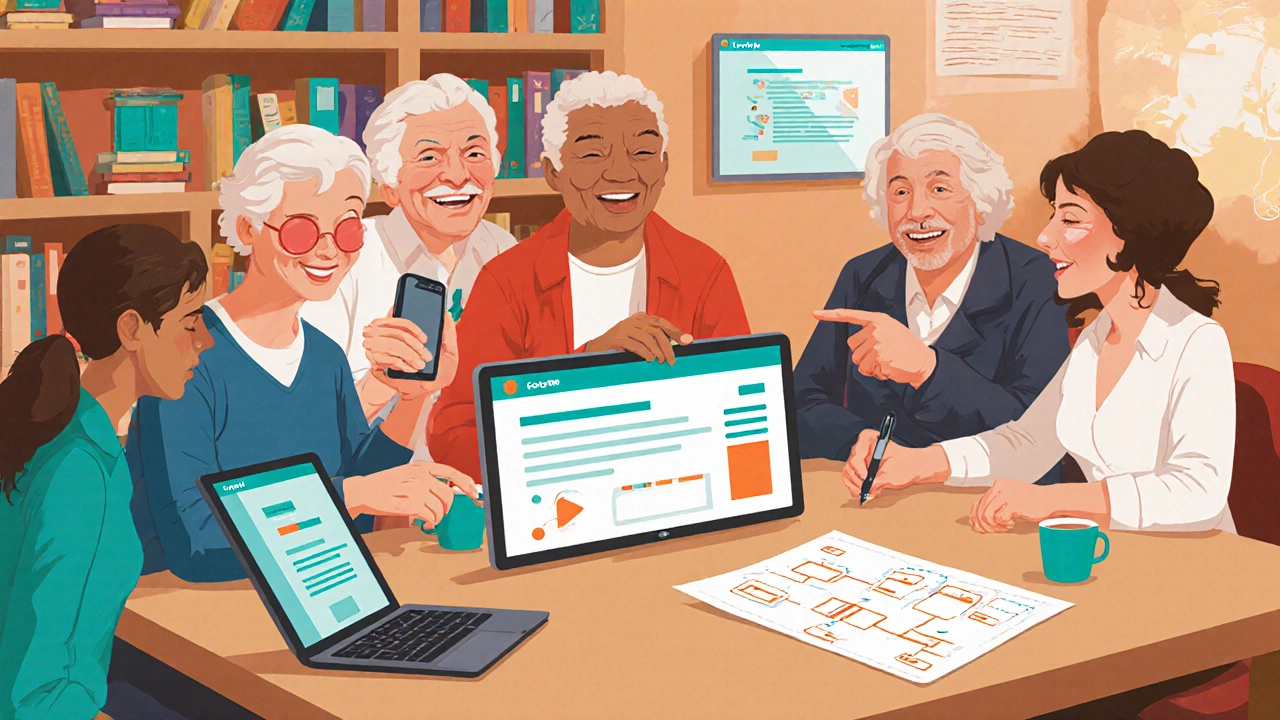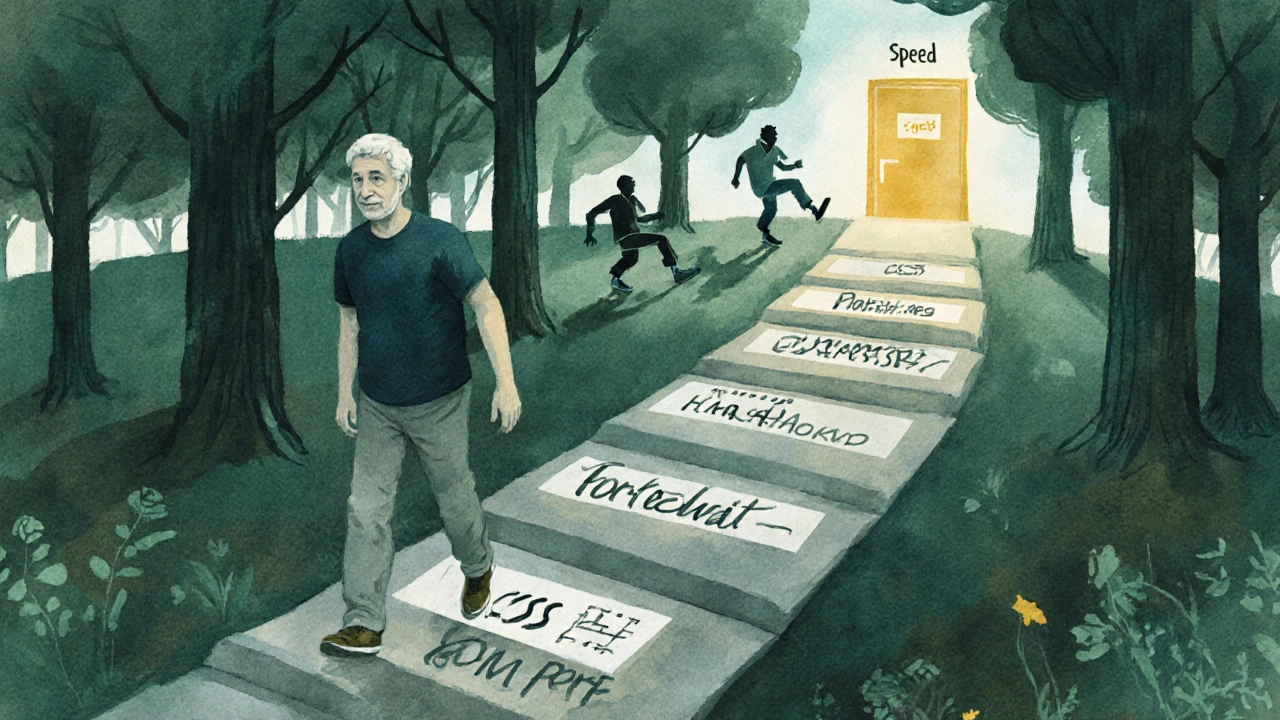Career Transition Calculator
Your Learning Plan
Based on Stack Overflow's 2024 survey data showing 22% of developers started after 35
Your Path Forward
Enter your weekly study hours to see your estimated timeline
You’re 40. You’ve spent years in a job that no longer fulfills you. Maybe your industry is shrinking. Maybe you’re tired of commuting, or you just want to build something real with your hands-except now it’s code instead of wood or steel. And then the thought hits: Is 40 too old to become a web developer? The answer isn’t a simple yes or no. It’s a resounding no-with a few real-world caveats.
Age doesn’t slow down learning-it changes how you learn
People say you need to start young to code. That’s a myth built by Silicon Valley bros who dropped out of college at 20. The truth? Adults learn differently, and that’s an advantage.
At 40, you don’t waste time on flashy tutorials that promise to turn you into a developer in 7 days. You know what matters: structure, consistency, and solving real problems. You’ve dealt with deadlines, budgets, and difficult people. That’s more valuable than memorizing syntax.
Studies from the University of California, Berkeley show that adults over 40 retain complex information better when it’s tied to real-world context. That’s why people who switch careers later often outperform younger peers in practical coding tasks. They don’t just write code-they understand why it’s needed.
What you actually need to start
You don’t need a computer science degree. You don’t need to be a math genius. You don’t even need to be the fastest typer in the room.
Here’s what you do need:
- HTML-the skeleton of every website. Learn it in a weekend.
- CSS-how things look. You’ll get this faster than you think.
- JavaScript-how things work. This is the biggest leap, but there are tools like CodePen and freeCodeCamp that walk you through it step by step.
After that, pick one path: front-end (what users see) or back-end (what runs behind the scenes). Most people start with front-end because you can see results immediately. Build a simple portfolio site. Then a blog. Then a small app that solves a problem you have-like tracking your grocery list or scheduling your kid’s soccer games.
Tools like VS Code, GitHub, and Chrome DevTools are free. You don’t need expensive software. You don’t need a fancy laptop. A 5-year-old MacBook or a $300 Chromebook will do just fine.
Real people, real stories
In Dublin, there’s a woman named Miriam who started coding at 43. She was a nurse. She hated the shifts. She took a 6-month online course through Udemy, built three small websites for local businesses, and landed a remote job at a SaaS startup within 10 months. She’s now 47 and earning more than she ever did in healthcare.
Then there’s James, a former truck driver in Cork. He was 41 when he started. He spent his lunch breaks learning JavaScript on his phone. He joined a local coding meetup every Tuesday. Two years later, he’s a junior developer at a digital agency. He didn’t need to be the smartest. He just showed up.
These aren’t outliers. They’re common. According to Stack Overflow’s 2024 developer survey, 22% of professional developers started coding after age 35. That’s more than 1 in 5. And 8% started after 40.

The hidden advantage: life experience
Young developers often write code that works-but doesn’t make sense to real users. They build features nobody asked for. They ignore accessibility. They don’t know how businesses actually run.
At 40, you’ve probably managed budgets, handled customer complaints, or led a team. You know what “user-friendly” really means. You understand deadlines. You’ve been burned by bad software before. That’s not a disadvantage-it’s your superpower.
Companies are starting to notice. More hiring managers now value maturity, communication skills, and reliability over raw speed. A 40-year-old who can explain a bug to a client in plain language? That’s worth more than a 22-year-old who can write perfect React hooks but can’t answer a simple question about usability.
What holds people back-and how to beat it
The biggest obstacle isn’t age. It’s fear. Fear of failing. Fear of looking stupid. Fear that you’ll be the oldest person in the room.
Here’s the truth: you will be the oldest person in the room. And that’s okay.
Most bootcamps and online courses have students in their 20s, 30s, and 40s. You won’t be alone. In fact, you’ll probably be one of the most focused people there. You’re not there to party. You’re there to change your life.
Here’s how to beat the fear:
- Start small. Build one thing. Not ten.
- Don’t compare your behind-the-scenes to someone else’s highlight reel.
- Find a mentor-someone who started later. Reach out on LinkedIn. Most will say yes.
- Track your progress. Write down what you learned each week. You’ll be shocked at how far you’ve come in 3 months.

Where to start: the best free and low-cost courses
You don’t need to spend thousands. Here’s what actually works:
- freeCodeCamp-100% free. Covers HTML, CSS, JavaScript, and even responsive design. Has a certification you can put on your resume.
- Codecademy-free tier is solid. Paid version ($15/month) unlocks projects and quizzes. Worth it if you need structure.
- MDN Web Docs-the official Mozilla guide. Dry, but the most accurate resource on the web.
- YouTube channels: The Net Ninja, Kevin Powell, and Traversy Media all have beginner-friendly playlists designed for adults.
Don’t jump between courses. Pick one. Stick with it for 60 days. Even if you only do 30 minutes a day, you’ll be ahead of 90% of people who quit after a week.
It’s not about being the best-it’s about being consistent
Web development isn’t a race. It’s a marathon with no finish line. The best developers aren’t the ones who learned the fastest. They’re the ones who kept going.
At 40, you’ve already proven you can stick with something hard. You’ve raised kids. Paid bills. Survived layoffs. You know what it means to show up when you don’t feel like it.
That’s the real skill.
Build one project. Share it. Get feedback. Improve. Repeat. In 12 months, you won’t recognize the person you were when you started. And you won’t care if you’re the oldest in the room. Because you’ll have something they don’t: real experience, real confidence, and a career you actually chose.
Can I get a job as a web developer at 40 without a degree?
Yes. Most web development jobs don’t require a degree. Employers care more about your portfolio, problem-solving skills, and ability to communicate. A GitHub profile with 3-5 live projects and a clean resume will get you further than a diploma you didn’t earn.
How long does it take to get hired after starting?
Most people land their first job between 6 and 12 months. It depends on how much time you put in. If you study 15-20 hours a week, you can be job-ready in 8 months. If you’re only doing 5 hours a week, it’ll take longer. Consistency beats intensity.
Is it too late to learn if I have no tech background?
Not at all. The majority of developers who started after 35 had zero tech experience. Many came from teaching, nursing, retail, and construction. You don’t need to be a “tech person.” You just need to be willing to learn step by step.
What’s the average salary for a web developer over 40?
In Ireland, entry-level web developers earn between €35,000 and €45,000 annually. With 2-3 years of experience, that jumps to €50,000-€65,000. Age doesn’t directly affect salary-but experience, reliability, and communication skills do. Many developers over 40 move into senior roles faster because they bring maturity to the team.
Should I go to a coding bootcamp?
Only if you need structure and accountability. Bootcamps can be expensive (€5,000-€10,000) and aren’t always worth it. Many free resources are just as good. If you do choose one, pick a local or online program with strong job placement stats and alumni reviews. Avoid anything that promises a job guarantee.
Next steps: what to do this week
Don’t wait for the perfect moment. It doesn’t exist.
- Go to freeCodeCamp.org and complete the first 3 lessons (HTML, CSS, JavaScript basics).
- Build a simple one-page website about yourself-your hobbies, your story, why you’re learning to code.
- Post it on GitHub Pages for free. That’s your first portfolio piece.
- Join one online community-like the freeCodeCamp forum or Reddit’s r/learnprogramming.
- Write down one reason why you’re doing this. Keep it somewhere you’ll see it every day.
You’re not too old. You’re just getting started. And the world needs more developers who understand what it means to be human-not just write code.
